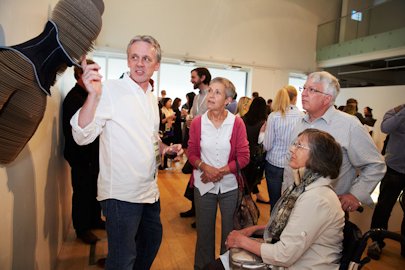Medical technology designers to face Dragons Den judges for £10,000 innovation prize
Medical technology designers are to pitch a new contoured support snood helping to improve the quality of lives of motor neurone disease sufferers whose neck muscles have weakened to a panel of Dragons’ Den style judges as part of a £10,000 innovation challenge.
A team of experts from the National Institute for Health Research (NIHR) funded Devices for Dignity Healthcare Technology Co-operative have been singled out from hundreds of entries across the country to showcase the work as part of the NHS Innovation Challenge Prizes ‘Acorn Challenge’.

The NHS Innovation Challenge Prizes is being run by NHS England and aims to recognise and reward small ideas that have the potential to make a big difference to patients.
The Sheffield support snood is a lightweight neck collar that sits along the contours of the patient’s neck muscles, allowing patients’ freedom to move their neck.
The unique design – which has been tested on 26 patients suffering with motor neurone disease – could be used for patients suffering with other devastating neurological conditions, such as stroke and trauma, and makes everyday tasks such as eating and speaking easier for patients whose quality of life is already severely impaired by debilitating illnesses.
The Sheffield support snood has been designed and developed thanks to a collaboration between the NIHR Devices for Dignity Healthcare Technology Co-operative, Sheffield Teaching Hospitals NHS Foundation Trust, Sheffield Hallam University and the University of Sheffield.
Nicola Heron, programme manager for the NIHR Devices for Dignity Healthcare Technology Co-operative, said: “The Sheffield support snood was created in response to patients living with motor neurone disease and other neurological conditions who told us existing neck collars provide insufficient support or completely immobilise the neck, negatively impacting on the quality of their life.
“Although we cannot stop the disease itself from worsening, the collar has the potential to make life more comfortable for patients already suffering with a debilitating illness by alleviating pain and discomfort caused by weakened neck muscles.
“We’re delighted that we’ve been given this fantastic opportunity to showcase the significant improvement in wellbeing our newly-designed collar offers. If successful we will use the prize money to manufacture a new batch of collars for patients with motor neurone disease, which can market in the UK and other big countries such as the USA. We are also keen to explore if the product can be used to support patients with other neurological conditions.”
The team will present in front of the Dragons’ Den NHS Innovation Challenge Prizes judges on Wednesday 3 December. The judging panel will consist of leading figures from the NHS, industry and third sector.
Winners will be announced on or after Thursday 8 January 2015.
To find out more about the NHS Innovation Challenge Prizes visit www.england.nhs.uk/ourwork/innovation/challenge-prizes

